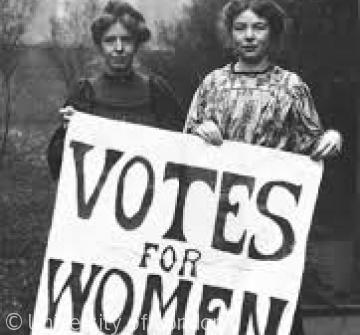The Campaign for Women’s Suffrage in Basingstoke: 1908-1914

In the years leading up to the First World War the impact of the campaign for women’s suffrage was as evident in Basingstoke as in every other part of the country. The campaign aroused strong feelings on both sides of the argument as to whether or not women should be granted the right to vote in parliamentary elections. Moreover, amongst supporters there was a clear divide between the moderate suffragists of the National Union of Women’s Suffrage Societies (NUWSS) and the militant suffragettes of the Women’s Political and Social Union (WPSU). In the absence of opinion polls, it is difficult to judge the balance of views in Basingstoke or the extent to which residents engaged with the issue. What can be said is that few in the town, if any, could have been unaware of the campaign and the arguments advanced by supporters and opponents alike.
From November 1908, when a local branch of the NUWSS was established, until the outbreak of War there were frequent meetings, held in various locations, both indoors and outdoors, by both advocates and opponents. These were faithfully reported, often in considerable detail, in the Hants and Berks Gazette. Moreover, national figures from both sides of the campaign were sometimes the principal speakers. Those advocating the cause of women’s suffrage included, in October 1910, Mrs Millicent Fawcett, the President of the NUWSS, and in November 1912, Miss Margaret Ashton, Manchester’s first female city councillor. Of the opponents, the most renowned were Miss Mary Angela Dickens (grand-daughter of Charles Dickens) of the Women’s National Anti-Suffrage League, who spoke in February 1909, and Leo Maxse, editor of the National Review, in February 1911. Among the local leadership, who chaired and spoke at meetings, were Mrs Conran, Mrs Isabella Raynbird and Miss Dorothy Edwards. The last two were members of a deputation which met Arthur Clavell Salter, the Conservative MP for Basingstoke from 1906 to 1917, in July 1912. He can best be described as being moderately sympathetic towards the cause of women’s suffrage.
In the main, it would seem that most local supporters of women’s suffrage were moderates. Indeed, the WPSU Newspaper, Votes for Women, gives the impression that there were few suffragettes in the town. There are no reports of any ‘direct action’ in Basingstoke, such as seeking to blow up letter boxes, and only one incident of any notoriety. This occurred at an open air meeting held in the Market Place in the summer of 1911, at which the speaker was a leading suffragette, Mrs Leigh. While speaking ‘a boy, without any warning, threw a stone at her, hitting her on the head … Without an instant’s hesitation, Mrs Leigh leapt from the wagonette, caught the boy by the collar, held him until he humbly apologised before the crowd, released him, and was back in the wagonette finishing her last sentence before the astonished audience realised what a narrow escape she had had.’
(For the source of the quotation please see the asset)
Roger Ottewill
September 2018
Content derived during research for the new VCH Hampshire volume, Basingstoke and its surroundings.


